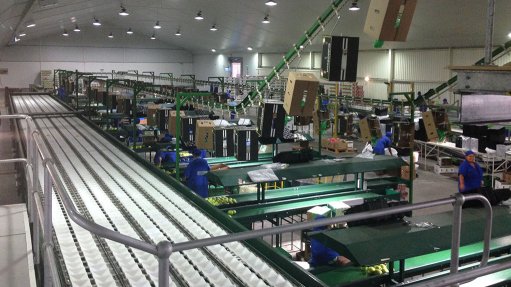
DIRECTING DEVELOPMENTS The need to improve the efficiency of water and energy use, coupled with the introduction of the Fourth Industrial Revolution, are shaping agricultural engineering innovations in South Africa
The agricultural industry remains key to the development of South Africa and addressing the country’s prevalent unemployment issues, but local agricultural engineers are a scarce breed, says South African Institute of Agricultural Engineers (SAIAE) VP Thabo Mavundza.
“Despite the drought, water rights allocations and the questions around land reformation challenges, the sector continues to grow,” he adds.
While South Africa’s gross domestic product shrank by 2% in the first quarter of the year, agriculture grew by 27.8% in the first quarter, compared with the 2019 comparable period.
Subsequently, private-sector work in the agricultural engineering field has increased; however, government has failed to retain and create employment opportunities for agricultural engineers, says Mavundza – who is also the engineering manager of multinational supplier of fresh subtropical fruit Westfalia Fruit Estates.
“We are engaging government to ensure that every province is employing and retaining agricultural engineers. We are fortunate to have some members who occupy vital roles within government entities and understand the importance of involving agricultural engineers in their projects.”
He tells Engineering News that, over the past 15 years, positions in the field of agricultural engineering have mostly been occupied by civil and mechanical engineers, instead of agricultural engineers, in private, government and agricultural organisations.
A career as an agricultural engineer is not popular, as it is mistaken for being a farmer, and has, consequently, led to a shortage of skills in the sector.
“SAIAE has streamlined efforts and resources to promote and grow an awareness of agricultural engineers by sharing their core skills and success stories, as well as to improve trust in qualified practitioners. These efforts are slowly showing results in most organisations, but the issue is compounded by the lack of tertiary education bursaries,” says Mavundza.
However, the need for renewed infrastructure, such as dams, roads, research stations and pack houses, to realise the full potential of South Africa’s agriculture sector, as well as land reform, corruption and a lack of government funding, threaten the existence of agricultural engineers, he advances.
Innovation Drivers
The need to improve the efficiency of water and energy use, coupled with the introduction of the Fourth Industrial Revolution, are shaping agricultural engineering innovations in South Africa.
Subsequently, agricultural engineers continue to introduce innovative solutions and address challenges in mechanisation, irrigation and bulk-water movement, dams, post-harvest handing systems, animal handling facilities and alternative or renewable energy.
“These solutions are being introduced through different platforms to government, consultants and private-sector engineers and farmers. In addition, agricultural engineers have, over the years, proved to be great operations and business managers with their ability to relate, understand and work with engineers from all other disciplines,” says Mavundza.
End-users are adopting these solutions; however, they need to be tailored by agricultural engineers for every farmer and organization’s needs to get full cooperation and adoption.
“Agricultural engineers are trained to cocreate solutions, specifically for individual farmers, and take them through the journey until full implementation. These solutions are mainly meant to ensure sustainability, growth and profits for the farming community,” explains Mavundza.
Challenging Covid-19
With the Covid-19 pandemic, the institute has been forced to reinvent its biennial multi-day symposium, which it planned to host in Limpopo for the first time.
“This is usually our flagship event, with good networking for all those who attend. This is being reinvented into a virtual event that we are excited about,” says Mavundza.
In terms of our members, there are many private companies that have retrenched agricultural engineers, so the pandemic has had a devastating impact on these engineers.
Owing to the pandemic, SAIAE has realised the need to consider scenario planning to strategically move the institute forward.
SAIAE is planning webinars and leveraging its online biennial symposium to provide online access for members with regard to continuous professional development content required to maintain their professional registration with the Engineering Council of South Africa.
“Agricultural engineers are at the centre of the food, water and energy nexus and are, thus, vital to ensuring food security and sustainability for the future,” says Mavundza.